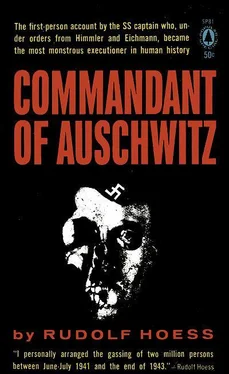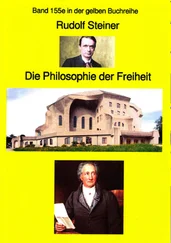It was good nature, too, which made him forgive many failures on the part of his staff.
When, after Liebehenschel’s departure to Auschwitz, Maurer became Glücks’s deputy and at the same time I became head of Department DI, Maurer and I rid headquarters of most of the officers and men of the staff, who up to then had been considered, indispensable. There was a certain amount of argument with Glücks over this, but Maurer finally threatened to go to Pohl, and Glücks gave way with a heavy heart.
Gradually he handed over the reins, which he had never held very tightly, to Maurer. Apart from Maurer, whom he had to check when he considered his actions too severe, his only worry then was the Reichsführer SS.
Glücks was the opposite to Eicke in every respect. Both held extreme views and both were responsible for developing the concentration camps in a way that inevitably ended in tragedy.
POPULAR LIBRARY • NEW YORK
All POPULAR LIBRARY books are carefully selected by the POPULAR LIBRARY Editorial Board from the lists of the country’s major book publishers and represent fiction and non-fiction tides by the world’s greatest authors.
POPULAR LIBRARY EDITION
Published in January, 1961
Copyright © 1951 Wydawnictwo Prawnicze, Warsaw
English translation copyright © 1959 by George Weidenfeld and Nicolson Ltd.
Library of Congress Catalog Card Number: 60-5808
Front cover photograph: Erwin Blumenfeld
Back cover photograph: United Press International
This book has been published in Denmark, England, Finland, France, Germany, Italy, Norway, Poland, Sweden and the United States.
Published by arrangement with The World Publishing Company
The World Publishing Company edition published in March, 1960 First printing: January, 1960 Second printing: May, 1960
Kommandant in Auschwitz, Stuttgart, Deutsche Verlags-Anstalt, 1958.
The relevant documents are IMG XXXIII, Doct. PS-3868: IMG XI, S.438 et seq: Nuremberg Doct. NI-035/037: and Nuremberg Doct. NI-039/041.
G. M. Gilbert, Nuremberg Diary, New York, Farrar, Straus, 1947.
Omissions are explained in footnotes.
Here omitted.
See also Auschwitz-Birkenau, by Dr. Jan Sehn, Wydawnictwo Prawnicze, Warsaw, 1957. This is published in English, as well as in Polish and German, and is the best short description of Auschwitz known to me.
For example: The Scourge of the Swastika, by Lord Russell of Liverpool, New York, Philosophical Library, 1954.
These were instructions issued by Wehrmacht Headquarters regarding certain categories of prisoners of war who were deprived of prisoner-of-war-status and sent to concentration camps to be shot in the neck.
Nacht und Nebel, Night and Fog. The object of the Nacht und Nebel decree issued by Hitler on December 7, 1941, was to insure that non-German civilians in occupied territories, alleged to have committed offenses against the German occupation forces, were taken secretly (hence night and fog) to Germany unless it could be guaranteed that a death sentence would be passed if they were tried by a military court in their own country.
the name was omitted
This was a reference to the Austrian Anschluss.
Rudolf Hoess’s father, Franz Xavier Hoess, was a salesman.
The 21st (Baden) Regiment of Dragoons.
Hoess was twice wounded, in Mesopotamia and Palestine. In 1917 and 1918 he received the Iron Cross, 1st and 2nd class, the Iron Crescent, and the Baden Service Medal.
Volunteer units of former soldiers which sprang up in Germany at this time, and which were originally formed to safeguard the frontiers and prevent internal disturbance. The one he belonged to was the Freikorps Rossbach, with which he fought in the Baltic States, Mecklenburg, the Ruhr, and Upper Silesia.
Medieval courts that sat and passed sentence in secret.
The State Court for the Defense of the Republic was established in connection with the Law for the Defense of the Republic, enacted June 26, 1922. It is incorrect to say that it was “specially” created to deal with Vehm murders. Paragraph 7 of the law in question shows that this court was competent to judge cases in which the accused were tried for crimes directed against the Republic (as a state form) and against members of the government. This law was passed, and the court in question established, consequent on the murder of the Foreign Minister, Rathenau, on June 24, 1922. (For an interesting though not always reliable description of this murder by one of the murderers, see The Answers of Ernst von Salomon, London, Putnam, 1945.) The court was not concerned with Vehm murders as such. The reason why the Parchim trial was held in this court, at Leipzig, and not in the normal district court at Schwerin, was that the Schwerin State Attorney had declared that Hoess and almost all his accomplices in the crime belonged to the “Union for Agricultural Professional Training,” an illegal successor organization to the banned “Rossbach Labor Community,” which itself had been the Freikorps Rossbach, also declared illegal, under another name: since this organization was hostile to the republican form of government, political crimes committed by its members as such made them subject to the jurisdiction of this special court.
Hoess’s description of the Parchim murder is colored in his favor and contains inaccuracies. Evidence given before the court which sat in Leipzig from the 12th to the 15th of March 1924, shows this to have been a particularly brutal murder. It had been decided that a former elementary schoolteacher by the name of Kadow was a Communist spy who had infiltrated the Rossbach organization. Hoess and others—Martin Bormann was indirectly implicated— spent the night of May 31-June 1, 1922, drinking, and then abducted Kadow into the woods, where he was beaten almost to death with clubs and branches, after which his throat was cut and he was finally finished off with two revolver bullets. There is not the slightest scrap of evidence to show that Kadow was in any way connected with the Schlageter affair. However, since Schlage-ter had been condemned to death by the French authorities in the Ruhr only a few days before the Kadow murder, it is possible that Hoess had been confused by remarks that Kadow was a traitor “like the man who betrayed Schlageter to the French.” Nor is there any reason to believe that the man who gave evidence against Hoess and the others sold his story to Vorwärts. He was named Jurisch, and the Court for the Defense of the Republic decided that he told his story, thus implicating himself, because he feared lest he himself be murdered by members of the Rossbach organization for knowing too much.
Hoess was arrested on June 28, 1923. On March 15, 1924, he was sentenced to ten years’ imprisonment, six months of this sentence to count as already served.
Dr. Erich Zeigner had attempted to set up a Communist government in Saxony, and was deprived of his functions as Prime Minister and Minister of Justice for Saxony by a decree of the President of the Reich dated October 29, 1923. He was later tried on a charge of abuse of public office, specifically for destroying public documents and subverting public funds for political party ends. On March 29, 1924, he was sentenced to three years in prison.
Читать дальше












